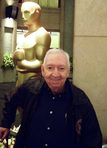Jack Fitzgerald's Blog, page 7
July 30, 2015
Turkey Part 1
 Istanbul is a city in Turkey that straddles Europe and Asia across the Bosphorus Strait. The Old City reflects cultural influences of the many empires that once ruled here. In the Sultanahmet district, the open-air, Roman-era Hippodrome was for centuries the site of chariot races where Egyptian obelisks still remain. The iconic Byzantine Hagia Sophia features a soaring dome and Christian mosaics.
Istanbul is a city in Turkey that straddles Europe and Asia across the Bosphorus Strait. The Old City reflects cultural influences of the many empires that once ruled here. In the Sultanahmet district, the open-air, Roman-era Hippodrome was for centuries the site of chariot races where Egyptian obelisks still remain. The iconic Byzantine Hagia Sophia features a soaring dome and Christian mosaics.
Three months ago when I began making plans to visit Turkey, people looked at me as though I had lost my mind. Why Turkey? They thought I was headed for a third-world place of little interest and abject poverty. The closer my trip approached my friends let me know they thought I was going to be in danger in that part of the world and that it couldn’t possible be of much interest.

This oldest known wooden house is 2,700 years old.
The basic fact is that I am on an Insight bus tour for two weeks. So, why Turkey? It has tons of history and historical places. This tour takes most of them in and in great comfort, I might add.
I knew from the moment I landed in Turkey, I was going to be in for some interesting history lessons and exciting site seeing.
Our first day my fellow bus travelers (all Australians and great people) discovered how modern Istanbul is. It has one foot in Europe and the other in Asia. Yesterday we took a boat trip across the Bosphorus and saw old palaces, forts, and modern bridges spanning the two continents.

Limestone tomb from the time of King Midas.
Turkey is a Moslem country and you see many women wearing scarves, long dresses, and full dress including only a slit for their eyes. A memorable sight I noted yesterday on a ferry crossing of the Marble Sea were three veiled women taking photos of themselves with their iPhones. Selfies.
Make no bones about it, Turkey is an economic powerhouse. Skyscrapers, tons of Mosques, with the city of Bursa being the new Detroit of Europe. Filled with auto factories of all brands, it furnishes this part of the world with autos.

City of Ankara.
Today on our way to Ankara, we stopped to see where King Midas ruled and where money was first used, in the form of coins. We also saw where Alexander the Great untied the Gordian knot and we saw the oldest wooden structure in the world, a 2,700 year-old house. All of these things we saw in a very limited area of perhaps 20 miles.
Ankara is a very modern city of beautiful buildings and four million very active citizens. Not to be missed, this cosmopolitan city will take your breath away.
So much to see. So much to experience, and we have only just begun. Tomorrow we go to the Cappadocia region which is full of underground cities.
So why Turkey? Because it’s wonderful, that’s why and the people are super friendly. More next week from this truly exciting place!
July 23, 2015
Père Lachaise Cemetery
(I am presently on vacation in Paris, Istanbul and Venice. I will continue with my blogs weekly on Thursdays and mention some of the things that are catching my eye. Happy vacation to each of you.)
Cimetière du Père Lachaise is one of the top tourist attractions in Paris, France. It is in all probability the largest collection of deceased human talent in the world. For sure it is the most visited graveyard in the world. With so many interred famous people, the locale is a must see. You might be thinking this is a rather morbid way to spend an afternoon but consider it a most unusual who’s who and a different type of museum.
The cemetery covers 110 acres and has thousands of tombstones. At the entrance are signs pointing you in the direction of the very famous. You will walk down shaded cobblestone streets and it becomes like a city with a city. The amount and variety of grave art is staggering.
You can book a walking tour or go on your own. If you chose the later, you can take the Paris Metro (subway) to the stop Philippe August on line 2 which lets you out right at the main entrance. If you get off at the Père Lachaise stop, you will be a bit of a distance from a side entrance. Actually the stop most people prefer is the stop at Gambetta on line 3 that lets you out at an entrance very near the tomb of Oscar Wilde. You then walk downhill to visit the rest of the cemetery.
Here are four of the residents there. On the internet, you will find dozens and dozens of the most gifted talent of the last two hundred years who call this unique cemetery their final resting place.
 The grave of Oscar Wilde is probably the most famous tomb in Père Lachaise. Wilde died in France after leaving England to avoid the shame of his conviction for ‘gross indecency.’ His legendary wit is said to have extended to his deathbed, where he is supposed to have quipped – “My wallpaper and I are fighting a duel to the death. One or the other of us has to go.” Today the monument stands covered in lipstick where women kiss the stone. There must be a reason for this but I have yet to find out why.
The grave of Oscar Wilde is probably the most famous tomb in Père Lachaise. Wilde died in France after leaving England to avoid the shame of his conviction for ‘gross indecency.’ His legendary wit is said to have extended to his deathbed, where he is supposed to have quipped – “My wallpaper and I are fighting a duel to the death. One or the other of us has to go.” Today the monument stands covered in lipstick where women kiss the stone. There must be a reason for this but I have yet to find out why.
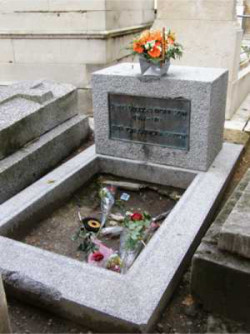 Jim Morrison, lead singer of The Doors, has a very simple tomb but it is one of the most popular in the cemetery. After Morrison died in 1971, of a suspected drug overdose in Paris, he was buried in an unmarked grave in Père Lachaise. When the cemetery placed a plain marker on the site, it was stolen. The same thing happened to a bust of Morrison placed on his gravestone. Many visitors leave gifts on Morrison’s gravesite, but many also use his gravestone as a giant bulletin board, leaving poems and all sorts of messages. In 2008, the cemetery hired a guard to ensure that visitors to Morrison’s grave did no more damage. Now a simple block of stone bears the message, in Greek, “According to his own demon.”
Jim Morrison, lead singer of The Doors, has a very simple tomb but it is one of the most popular in the cemetery. After Morrison died in 1971, of a suspected drug overdose in Paris, he was buried in an unmarked grave in Père Lachaise. When the cemetery placed a plain marker on the site, it was stolen. The same thing happened to a bust of Morrison placed on his gravestone. Many visitors leave gifts on Morrison’s gravesite, but many also use his gravestone as a giant bulletin board, leaving poems and all sorts of messages. In 2008, the cemetery hired a guard to ensure that visitors to Morrison’s grave did no more damage. Now a simple block of stone bears the message, in Greek, “According to his own demon.”
 Chopin is the master of compositions for the solo piano. His work still dazzles audiences everywhere and is a must for anyone learning to play the piano. Chopin grew up in Warsaw, Poland, but settled in France in later life. Chopin died in Paris after a long battle with lung disease. His body was buried in Père Lachaise but his heart was removed and buried in his homeland. His grave is usually adorned with many bunches of flowers, and is notable for a statue of the muse of music who weeps as she contemplates a broken lyre.
Chopin is the master of compositions for the solo piano. His work still dazzles audiences everywhere and is a must for anyone learning to play the piano. Chopin grew up in Warsaw, Poland, but settled in France in later life. Chopin died in Paris after a long battle with lung disease. His body was buried in Père Lachaise but his heart was removed and buried in his homeland. His grave is usually adorned with many bunches of flowers, and is notable for a statue of the muse of music who weeps as she contemplates a broken lyre.
 Jean-Baptiste Poquelin, better known as Molière, was one of the greatest comic playwrights of all time. Molière’s death was as unusual as his plays. Molière suffered for many years from TB. Despite his illness, Molière insisted on performing in his play Le Malade Imaginaire (The Hypochondriac). In this play, a man suffers terribly from illnesses he does not have. Molière, on the other hand, was suffering terribly from a real illness. While playing the part of the hypochondriac, he had a coughing fit and died later at home. Since Molière was an actor, he was not allowed to be buried in consecrated ground. His remains were finally transferred to hallowed ground in 1871.
Jean-Baptiste Poquelin, better known as Molière, was one of the greatest comic playwrights of all time. Molière’s death was as unusual as his plays. Molière suffered for many years from TB. Despite his illness, Molière insisted on performing in his play Le Malade Imaginaire (The Hypochondriac). In this play, a man suffers terribly from illnesses he does not have. Molière, on the other hand, was suffering terribly from a real illness. While playing the part of the hypochondriac, he had a coughing fit and died later at home. Since Molière was an actor, he was not allowed to be buried in consecrated ground. His remains were finally transferred to hallowed ground in 1871.
So many interesting lives to contemplate as you walk through this extremely interesting site. If you’re in Paris, don’t miss it.
July 16, 2015
Paris: Getting There
Years ago during the era of the big trans-Atlantic ocean liners, The French Line had as its motto: “Getting There is Half The Fun.” Fast forward to July 9th, 2015, when I left Palm Springs for my annual visit with my friends in Paris, France.
I was suppose to have just an ordinary airline trip from Palm Springs to Paris. I was to leave at 8 am in the morning, fly on United Airlines to San Francisco, change planes for Newark, New Jersey, then continue on to the City of Lights with an arrival at 10:55 in the morning.
I arrived at the airport at 6:30 am to begin this yearly ritual of going to Paris for three weeks. What began as ordinary suddenly turned into the extraordinary. New adventures all of a sudden and for the next 24-plus hours turned into more of the adventure I wrote about in my blog a week or so ago.
 First off. an announcement was made that said my plane would be a little late in taking off. That announcement then turned into a two-hour delay due to mechanical problems. Then that turned into an additional 30 minutes.
First off. an announcement was made that said my plane would be a little late in taking off. That announcement then turned into a two-hour delay due to mechanical problems. Then that turned into an additional 30 minutes.
We were told to go to the airline desk where, after waiting forever, I was told that all my connections were lost. They then issued me new travel documents.
I really was so distraught by this point, I didn’t look closely at the newly issued tickets. I merely took off for the first part of this unexpected adventure.
I was to leave the airport and take a taxi to Los Angles International Airport. They issued me a voucher for $250 to give the taxi driver. I had to pick up my suitcase which had already been checked on the old tickets. Once I got it back, I headed for the taxi stand. I gave the voucher to a driver and we took off as fast as we could to LAX, a two-hour freeway trip from Palm Springs.
Upon arrival, the driver informed me my ticket for the next leg of my trip, LAX to Dulles Airport in Washington D. C., gave me exactly 17 minutes to get on the plane.
I presented the ticket to a curb-side checker. He called a supervisor. They put me in a wheel-chair and as if we were out for some long-distance race went though check-in, security, and everything to indeed make it on the plane at the very last minute. I doubt if anyone had ever made such a fast connection.
On the plane I was ushered to my seat with haste and the plane took off. I could hardly believe I was headed to Washington D. C.
About one hour into the trip, a gentleman in the row across from me suffered a heart attack. A stewardess made an announcement over the PA asking for any nurse or doctor on board to present themselves. Two doctors showed up and they turned the seats across from me into a miniature hospital, with oxygen tubes falling down to the unfortunate patient. They saved him but with quite a bit of excitement going on near me.
That bit of adventure got settled and that is when I decided to check my new ticket from Dulles Airport to Paris–which I had not done due to all of the unexpected excitement and adventure. My eyes blinked in disbelief. The Paris connection in Washington was taking off at the same time as my arrival. I mentioned this meekly to a stewardess who had just played nurse in the medical emergency. She blinked as I told her my unusual story so far. She then had the pilot relay this to Dulles Airport.
Believe it or not, in spite of para-medics in the aisle coming to take the heart-attack victim away I was escorted onto the waiting plane like a movie star with all eyes on me.
Nothing unusual happened on the flight except I wondered what on earth had happened to my checked suitcase. Also I had a driver who was supposed to meet me in Paris to take me to my friends’ house. I decided I could not think of such things. I should just blot such things from my mind until I got to Paris.
Two miracles happened. My suitcase appeared in Paris (how I will never know) and, via my friends in Paris, the driver had been found and rescheduled.

Market in Paris
So in spite of all the unexpected adventure, I did arrive at the home of my friends not too worse for all the adventure. Other friends took us out last night to an excellent restaurant where we celebrated my arrival in Paris.
Today we went to the open-air market and my annual visit officially began.
So as I have said before, adventure is where you find it. Sometimes it may find you as it did via this trip to Paris.
My very best to you and I’ll keep you up with my adventures from here in Paris to later on in Istanbul and Venice. Thanks for following me on this topsy-turvy trip.
July 9, 2015
Writing Your Life Story
Many times you (or someone in your family) have come up with the idea of writing a family history or the story of one particular person in your family. You may have even thought of writing your own life story.
Certain questions naturally come to your mind. Who would care if I did or didn’t write some personal piece? Would anybody be interested in me and my life? Where would I begin.? How would I go about organizing it? What would I include? Would it all just be a piece of fluff and a waste of time? Wouldn’t I feel self-conscious? Wouldn’t I feel like my ego was getting a little out of control?
The answer to each question depends precisely on you. First of all, if you approached the project as a family history and asked others to pitch in and help, you could produce a stimulating project that more than likely would be appreciated for generations. The answer to the other questions would depend on how seriously you approached such a venture. The major answer to all the questions though centers around one word: ORGANIZATION.
You have a lifetime of experiences and you must choose between the interesting events and stories and let go of the things that are not all that interesting. One writer recently wanted to write about his life but he quickly got overwhelmed by the scope of the project. Too, too much information. He realized to go forward in a project like this, you must have a theme just as with any other piece of writing. You must have interesting characters. You must have lots of plot.
If you think of writing your life story in such terms, you will do very well and will not be self-conscious in the least. So what did this writer do? He merely made his book a very detailed compilation of a dozen or so Thanksgivings his family had celebrated. Some had theme, plot and interesting characters. He rejected the Thanksgivings where nothing really happened except a group of folks sitting around eating turkey. He concentrated on the juicy family tidbits that took place in the interesting Thanksgivings. That became his project. His book became a best seller. See, it’s your approach to this project that counts. Remember, the key word is ORGANIZATION.
You have the same bridge to cross if you write a novel. You can’t put everything about the man character in it. You have to be selective in choosing your subject matter. Think of your favorite TV show, be it thirty minutes or an hour. The authors include only what they want you to know. You don’t tell about the main character having a dish of vanilla ice cream unless there’s a story there. Everything has to have a story in a literary creation. Each portion, each vignette, each episode must have a beginning, a middle and an end. It has to have a predicament of some sort that has to be solved. It has to look like it can’t be solved but somehow at the last moment it is.
Now that we know how you must compose your material, let’s see what method and what material you are going to use. We will suppose you are writing your life story.
The Chronological Method. You simply list on large index cards each year you have been alive. Then you list on each card the event you can remember for that year. Once you have done this for every year, you then draw a red line under the events that have a plot potential—beginning, middle and end. Then you write your story.
The Milestone Method. Once again using large index cards, print on each card a highlight of your life. Once you’ve done that, you connect the present with the past. You list the ingredients of that milestone. Let’s say you have a son Donald who just graduated from high school. Then tell the background of your courtship to Helen, your wife, how you met her and later on how you were stopped by a cop on your way to the hospital for your son’s birth. At first the policeman didn’t believe you but once he saw your desperation, he gave you a siren escort and you made it just in time. Hence you named your son after the policeman. Make sure each step in your milestone has a beginning, middle and an ending. If you don’t have an interesting ending for each vignette, then ditch it and try for another more exciting event in your life.
The Episodic Method. Here you treat your life like a TV series. Each chapter of your book is about one particular story. They don’t necessarily have to be in chronological order. You take your large file cards and on each write a title like: The night my uncle escaped from the mental institution; The Time Aunt Charlene borrowed money to get her divorce.; The time my sister went to Mexico to study Spanish and returned with a husband instead of fluency in Spanish. The First and only course I ever flunked. Etc. Once you get enough of these episodes to fill a medium book, stop and you’re ready to write.
The Theme Method. This is the example I earlier gave about the guy who wrote only about the Thanksgivings in his family. A friend of mine who was a retired doctor wrote on file cards the most unusual cases he had treated in his career. This ended up a very interesting book.. I suppose one could do this if one had been a schoolteacher, a pharmacist, or in almost any profession.
Once you have chosen the method you will use, the next thing you must do is shift your memory into high gear. To do this, you will need a bit of help. These come to you via MEMORY GRAB TRIGGERS and QUESTIONS. Below you will find examples of both. You can make your own up if you need more.
MEMORY GRAB TRIGGERS: (use file cards for each topic)
Places you have lived; different houses, schools you’ve attended, cities.
Vacations
Jobs you’ve had.
Favorite movies.
Civic and community service you’ve performed.
Unique and interesting family members.
The automobiles you’ve owned.
Hobbies
Accomplishments.
Restaurants and eating out.
Music: favorite songs, concerts, singers.
Medical history.
Club membership and organizations you’ve belonged to.
Favorite games.
Favorite recipes.
Favorite sports.
Climate conditions you’ve experienced.
Technology.
Educational experiences.
Travel experiences.
Spiritual experiences.
Activities you’ve participated in.
Childhood experiences.
SELF-QUESTIONS: (write others on file cards)
What is the best gift you ever received?
What was the most difficult phone call you ever had to make?
Describe an unpredictable turn in your life.
What one possession of your mother or father do you have that when you look at it, you remember what? What feelings come over you?
What is the most beautiful place you’ve ever visited?
What is the best gift you ever received?
What life lesson did you learn the hard way?
What was the biggest surprise you ever had?
What was the worst rejection you ever experienced?
What is the worst experience you ever suffered?
What was the scariest moment you’ve ever experienced?
What was the worst storm or climatic condition you’ve ever experienced?
Who was the most generous person in your family and what was one of their best deeds?
Who was the stingiest person in your family and what was one of their worst deeds?
What was the best thing your mother cooked?
Where did you live when you were a child? Did you like it there?
Did you ever have a hobby?
Tell about your favorite pet.
Were you in military service? What was the best and worst part of it?
Describe the cars you have owned.
Did you have any nicknames?
Describe your favorite teacher. Worst teacher? Best boss? Worst boss?
What was the worst thing that ever happened to you at work? At school?
What was the worst joke ever played on you?
The list goes on and on. With proper ORGANIZATION, you’ll easily be on your way to writing the story of your life or that of your family. Have fun reliving all those memories!
July 2, 2015
ENCORE: Adventure
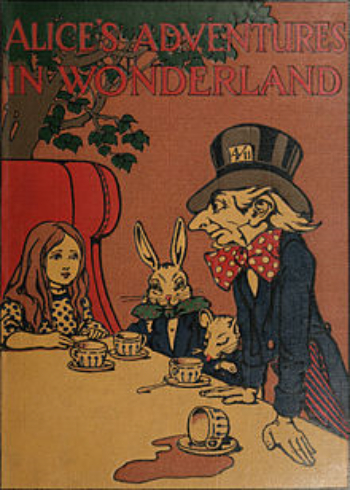
This literary work influenced me greatly as a child.
(Original publication September 25, 2014.)
Several years ago a good friend of mine told me that I should write down a lot of my adventures because I had lived such an adventurous life. Then a year or so ago, a good friend of mine (and former high school Spanish student who is very gifted in all things computer) after having run my web-site for several years suggested that I write a blog.
I agreed as I thought it might help the sales of my books, which seem to be coming out about one a year. At first I thought I should write a “how to” blog on screenwriting tips and writing readability in general. This lasted for about the first dozen or so blogs. Slowly but surely my blog went from the art of how to get words onto a page to a series of personal adventures. Instead of writing grammatical rules and script writing techniques, I finally found my niche—life adventures that one can translate to the written page.
Most people when they think of the word adventure, they think of something exciting and unusual. It may also be a bold, usually risky undertaking with an uncertain outcome. The term also broadly refers to any enterprise that is potentially fraught with physical, financial or psychological risk such as a business venture or other major life undertaking.
Since I changed over to “adventure writing”, you will obviously have noticed that my stories are all over the map literally—some high adventures and some quite small and home grown. For example: My adventures in growing up in Okolona, Mississippi; my adventures with some of my relatives and people I have known; my adventures in foreign lands and situations, my selling Fitzgerald’s Happiness Tonic.
In my blogs, I show how I have used all of these adventures in my writing. I really don’t have to sit and dream up plot complications. The way I have lived my life is enough to just pluck an adventure from my memory and transfer it to one of my screenplays, novels or stage plays.
I suppose I have been trying to show that if you want to become a writer, you must live first—that means get an undergraduate degree from the University of the World and a Graduate degree from the University of Hard Knocks. I have degrees from both. Actually this is what my friend was suggesting: Write down some of your coursework at both of those universities.
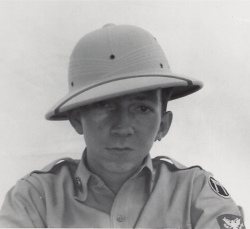
Intrepid Jack.
A couple of years ago I attended a high school reunion in my hometown of Okolona, Mississippi. I reunited with my best friend growing up. We were inseparable for all those teenage years. Then at age 19 we separated; he went to a Christian Bible School to become a preacher and I went off to Mexico, California, the Army, and a wide range of adventures in life. At that reunion, we hadn’t seen one another for 55 years. Even so, we took back up in our chatting like it had only been a weekend ago that we had seen one another. He told me after a bit, “You certainly have lived an adventurous life.” Then the next day from the pulpit after introducing me to his congregation he said, “Jack went to Hollywood and I went to Jesus Christ.” In a way, I suppose he was saying Jesus was the sum total of his adventure in life and mine was Hollywood and the worldly universe.
Adventurous living is where you put your neck out on the firing line of life. Which is the real adventure in life: Walking around in Rome searching for a cheap pension or taking a taxi from Rome’s airport to the Hilton where you have a reservation? Financial considerations may have forced you into the former—meaning you’re broke and traveling by the seat of your pants. The latter might mean your idea of adventure is playing ersatz movie star. Which would most people enjoy hearing about? The pension you finally found or how elegant the Hilton was. Who is the real adventurer?
Recently at a meeting of the Prime Timers, a group I belong to, I heard a guy tell about the trip he just got back from. It was one “fabulous” hotel and meal after another. His listeners grew weary after five minutes. Problem. No adventure. In writing, adventure equals plot. It’s that simple.
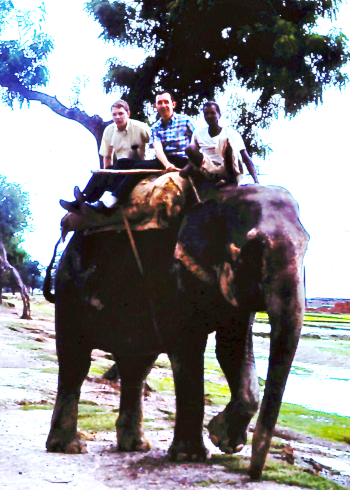
Jack and his friend Ken in Northern India.
I know that a lot of things I write about sound like high adventure and many of them are—like being caught up in the Cuban Revolution—like being arrested in East Berlin for black market currency dealing—like hitch hiking and getting picked up by some army guys who had stolen a car and were awol, etc. etc.
High Adventure is where one is involved in a bit of danger or where your livelihood is at stake or you are taking a big chance of some kind. Those are the most popular adventures we like to hear about. However, we can make life an adventure on a much smaller level. I remember when I was young there was a Hillbilly comedienne named Minnie Pearl out of The Grand Ole Opry in Nashville, TN. She was pretty much the country Joan Rivers of her day. She could make ordinary happenings hilarious. In the process, she became famous and wealthy and beloved.
So you see, adventure is where you find it. Some people get it in the kitchen. Julia Child made omelets an adventure and caught millions of people up in her world.
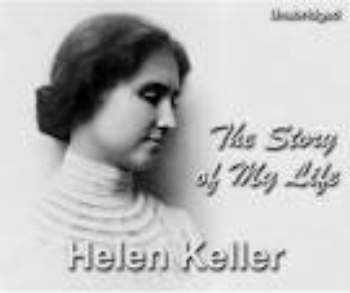 So just like my friend when he told me to put some of my adventures down on paper, I’m telling you the same thing. Put some of your adventures down on paper. You’ve had as many as I have but maybe just in your own way. You can keep them to yourself or you can share them—and then if they are interesting enough, they become adventures for others!
So just like my friend when he told me to put some of my adventures down on paper, I’m telling you the same thing. Put some of your adventures down on paper. You’ve had as many as I have but maybe just in your own way. You can keep them to yourself or you can share them—and then if they are interesting enough, they become adventures for others!
Adventure is where you find it and most importantly, what you make of it.
Cheers, put a little adventure in your life today. As Helen Keller said, “Life is either a daring adventure or nothing.”
My next adventure? Well, that would be my next book, Murder Impossible, coming out this November. (Note: Murder Impossible is now out and available.)
June 25, 2015
Questions
Ask anyone who knows me and they will tell you right off the bat, “Jack asks more questions than anyone I know.”
Yes, I admit I do ask a lot of questions. I guess I come by it quite naturally. The biggest question-asker in our family was my Aunt Elsie. She simply never ran out of questions to ask. When I was a kid, believe me, she grilled me a lot. She would ask questions about anything. Believe it or not though, I ended up being pretty much like her. In fact, just like her. I never let an unasked question slip by. I guess Aunt Elsie and I were what you might call serial question-askers.
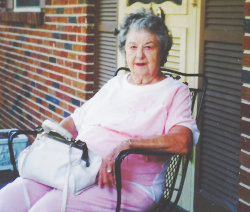
Aunt Elsie Howard
My mother was a question asker too but not in the same league with Aunt Elsie. My mother always would send me to the store instead of my brother because she could pick my brain better than his. When she asked him a question, he’d reply rather fractiously, “I don’t know.” After a dozen times of hearing “I don’t know” she would give up on him.
I was just the opposite. She could ask me how many people were in the store and I’d give her a head count. Just for good measure I’d toss in what they were buying and how they were dressed. Mamma ate that up with a stick, as they used to say back in Mississippi when I was growing up.
So, now it’s my turn to ask all the questions and I do a pretty thorough job of it. When I was young and my question-asking gene fully kicked in thanks to my mother Ruth and My Aunt Elsie, I enjoyed my avocation on any level and at any opportunity. I would go sit with Aunt Sally, a black woman who had actually been a slave up until she was five. I asked her every conceivable question and enjoyed everyone of her answers.
Once my Aunt Nanny Lou, just the opposite of Ruth and Elsie, said to me, ”I don’t know why you are always asking people questions. I can’t imagine what you’re going to do with all the answers.” I looked at her, smiled and replied, “I’ll probably use them one day when I become a writer.”
She was the type who dared not ask anything because she considered it bad form. She would always purse her lips and wait for you to give her answers to her unasked questions—commonly called ‘free-style gossip.” Even so, she was a wonderful influence in that she just let me prattle on and on and never told me, “Shut up, kid; you’re getting on my nerves!”
My father’s first cousin Sally Kelley was a published writer and she knew the value of the question-answer process in a writer’s life. She highly encouraged me even to keep a journal. By the time I was a Junior in high school, I was already writing short stories based on a lot of the information I had gleamed from one and all in my orbit.
Right now when I look back over my screenplays, stage plays and published novels, I smile with thanks to Aunt Elsie for helping me develop into such an inquiring person. I truly gained enough background information for two lifetimes as a writer. I have several current friends who are always saying, “Watch what you say around Jack. It could end up in one of his books.”
What I thought I’d do in this blog is equip you with some questions to ask just in case you aren’t the inquisitive type. These questions can serve to help you remember someone or something to write about or to be used in oral interviews in case you want to try your hand at being a talk-show host. At any rate, practice them out on your friends. They’re great social icebreakers.
Questions to ask one and all:
What was the happiest moment of your life? The saddest?
Who was a big influence in your life? What lessons did that person teach you?
Who is the kindest person you’ve ever personally known? The most evil?
What are the most important lessons you’ve learned in life so far?
What is your earliest childhood memory?
What is your favorite memory of me?
Relate to me an unusual story told in your family. What was your father’s favorite story? Your mother’s? Anybody in your family.
Who were the three most unusual people in your life? Any funny stories connected with them. Teachers, classmates, fellow workers, neighborhood.
What are you the proudest of in your life? Don’t tell us it was your kids and spouse. Somebody else please.
When in life have you felt the most alone?
What is the single most memorable thing that has ever happened in your life?
How has your life been different than you imagined it as a kid?
How would you like to be remembered?
Why did your parents name you what they did? Do you like your name?
What would you like written on your tombstone?
What is your major regret in your life so far?
What one thing do you realistically hope will happen in your future?
What was the best trip you ever took? What was the worst?
What is the best thing that ever happened to you? The worst?
If you could live your life over to this point, what would you change?
Is there anything that you’ve never told me but want to tell me now?
Is there something about me that you’ve always wanted to know but have never asked?
Cheers and enjoy your new self as a local inquisitor. It really could help you in your writing. Have fun asking questions and then think about using them in your writing.
June 18, 2015
The Rewards of Writing
A short time ago I received an interesting email from my good friend Bob in Boston. I have known him and his wife for quite a few years. We’ve always enjoyed a great friendship with the core being Paris and my writing. I would like to share with you his recent email to me.
Dear Jack,
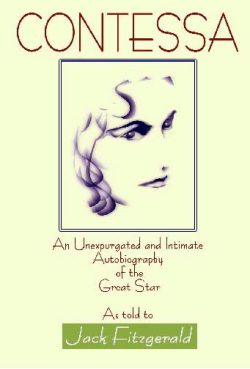
I was at lunch today with a couple of friends (gay couple in their 30’s). We were talking about Bruce Jenner (call me Caitlyn) and the subject turned to a transgender friend of theirs. They said he/she had been inspired by a book, Contessa that they all had read. I said I believe I know the author…they said it is written by Jack Fitzgerald; do you know the book? I said I know Jack…they said personally? I said yes. They were all excited and I proceeded to tell them about your blog and other books you have written. As I write this, I am still smiling. At one point they even asked “if we get to Palm Springs could we visit his estate?” I told them if they plan a trip I would give them your phone number but you prefer lunches or dinners as a guest. One said, authors can be eccentric and we would not want to intrude. Well, I said all you can do is call and see.
Bob
I was so pleased with Bob’s email that I shared it with another friend of mine. He wrote the following back to me:
Jack,
That’s a great story. Perhaps even blog-worthy. A blog about the rewards of writing —other than monetary.
Thanks, Pete
So, here I am taking Pete’s advice and writing today’s blog which is called THE REWARDS OF WRITING
The foremost reward in writing is to try and make a living off of your words. This in itself is a major return in exchange for your time and effort. It is the proof that turns you from an amateur into a professional. Beyond the check though is a different kind of reward. This is called “the personal award. “
Most writers I know carry a purpose into this profession. This mission causes them to choose writing above other means of earning a living.
The first group of writers is the social investigator. At the bottom of this person’s psyche is the calling to make social changes in areas they believe need addressing. These issues burn their butts and turn into the raison d’être for their becoming a writer.
The second group is the natural-born storyteller. Down through the ages, we have always had professional storytellers in Indian tribes or bands of natives in Africa. Before writing appeared on the scene, these oral storytellers were the historians of their culture. This sort of person has always existed in all cultures. Their present-day counterpart is busy telling historical stories such as GONE WITH THE WIND and ROOTS or “what ifs” such as Sci Fi, mysteries, thrillers or love stories a la the romance novels.
A third group of writers has appeared over the ages. These people write for the purposes of self-fulfillment and their own entertainment. Their reward is just to finish the project. Their desired outcome is only to focus on the creative side of the job. They never try for the monetary part. Writing becomes their private kingdom and this satisfies them totally. Some consider themselves above the crassness of commercial writing.
I will have to admit that I belong to the first group. Even as a child, I saw social injustices afoot and they interested me the most about life. I loved fairy tales which seemed to have a social premise and presented themes to live by. When I began writing at the age of ten, I was already for the little guy, the person in society who got dealt an unfair hand. I was a natural-born witch hunter like in all of those fairy tales. So, success to me as a writer was two-pronged: material and thematic. Yes, I was extremely pleased the first time I received a check for $5,000 for writing but was just as pleased when people connected with the life themes at the bottom of my writing.
In the email from my friend Bob, people I don’t know had read my book. One of them had even gained a pathway to better living via what was read in my book. Such comments tell you if you have done your job or not. Readers make comments on Amazon and Barnes and Noble online and these can become great indicators of how your writing is being accepted.
Here are two comments gleamed from these online giants. I chose them because, first of all , I do not know who wrote them. Secondly, they totally got the reason my book CONTESSA even exists. ( I know to some I will sound egotistical and self-absorbed by citing these statements.) Even so, I am pleased that these two readers of my book were totally with me on my journey of writing it. This is the sort of reward that makes a socially-themed writer validated in his or her own eyes.
(Amazon) “Contessa is the most touching book I have ever read. I was unable to put it down until i had finished it. I had gotten so immersed in the story that after I had finished it, it took another week to get over it. It affected me more than anything I had ever read before. This book gave me hope for my life! Her story is one of such success, in career and mainly in friendships. This is a truly wonderful story of overcoming extreme hatred and surviving through anything. Read it. It may open or change your mind, or at least allow you to understand!”
(Barnes & Noble) “If sexual matters offend you, frighten you or annoy you, you are one of the people who stands to benefit the most from reading ‘Contessa’. It opened my eyes a lot—not to mention my heart and my scope. I am so glad this book exists and that I had the opportunity to read it.”
A successful writer must have both material and raison d’être justification for his or her writing. This goes for the investigators, the storytellers and the writers who strictly write for money. Even the romance books have a theme and the authors who mostly are writing for wealth are still very gratified if a reader sees some social theme in their work.
Writing a novel, short story, stage play or screenplay is a challenge. The process requires a lot of mental as well as physical effort. It is a crapshoot at best and requires not only the time, effort and energy to birth it but you must have equal amounts of time to interest an agent or publisher in your work. Once your creation does find a home (publisher, stage or screen) you must do all you can to help make it a financial success. Once those hurdles are taken care of, you can then relax and enjoy the connection you hopefully have established with your readers and viewers.
Writers and artists rarely have an easy life at the beginning of their careers. One thing that encourages them more than anything else is that they have connected with their readers and that the reason they wrote the work has been appreciated. This is almost as important as the paycheck.
Writers sacrifice a lot to have the liberty and flexibility to work on their passions, interests and social interests.. Very few guidelines exist when it comes to the use of the imagination. Writing is a bit like anarchy. It is up to you to tame the mayhem that is in your mind. With talent and luck on your side, you can reap many rewards.
June 11, 2015
Satire and Irony
Two of the most admired elements in writing are satire and irony. They are very liked for a couple of reasons. First, humor is involved and most people find funny material easier to digest than turgid. Another fact that makes this writing popular is its candy-coated preaching. All in all, writers of satire and irony wish to expose and condemn the foolishness and corruption they see in an individual or a society.
Satire is writing which has the intention of improving humanity by criticizing the fads and foibles of a certain set of people. The writer uses his characters to stand in for real people and in doing so, attempts to expose their silliness, corruption, stupidity and shortcomings. He hopes that those he takes to task will take heed and change their ways. So, simply put, satire is the backbone of such TV shows as The Daily Show and The Steven Colbert show. These two programs contain almost 100% satire and irony. Most political cartoons, jokes and sketches are full of satire and irony.
Many people use the word irony but are not sure exactly what it is. The simplest definition would be to say that irony is a remark which speaks in opposites. Your use of words are opposite or contrary to the idea of what you’re saying or what your listener is expecting to hear. Here are three examples:
You knock over a glass of wine and say, “Oh, great! There’s goes six dollars down the toilet. “ It isn’t great. There’s no toilet. Literally, it spilled. So, you’re just talking in contradictions. We do it a lot without realizing it.
My neighbor has a Great Dane dog whose name is Tiny.
(Joke) A guy goes to his doctor after a series of tests and says, “Okay, Doc, let me hear the news.” The doctor says, “There’s some good new and some bad news. First, the bad news. You have terminal cancer and only have three months to live.” The patient is shocked and says, “What’s the good news?” The doctor says, “Did you see my new blond receptionist?” “Yes,” replied the patient. The doctor nudged him and grinned, “I’m banging her.” (This is total irony in a situation.)
Writers frequently employ these two tools to help change society’s views on a particular subject. Books, plays, TV shows and screenplays can be very popular instruments for changing people’s minds about a certain subject.
Several years back, I wrote a satirical novel entitled VIVA LA EVOLUCION. The title is in Spanish ironically but the book is in English. The work makes fun and attempts to spotlight why so much dumbness exists in our present-day society. I will share a portion of my book with you here so you can see how I employed satire and irony. These two elements can add readers to your audience because people like funny and the humorous over stuffy material any day—and it’s the easiest and most effective way to preach to people.
EXTRACT FROM “VIVA LA EVOLUCION.”
Chapter 3
That evening swinger Marvin Pencock spent happy hour at his favorite nightclub in D. C.—a fashionably trendy place called Home. In its previous incarnation, the club was a turn-of-the-century bank in the downtown financial district. The clientele since it entered phase two of its existence has consisted mainly of mid-echelon government workers, lobbyists, want to bes and would bes. If you mixed equal parts of the Playboy Mansion, Pee Wee’s Playhouse and the set of Martha Stewart’s Living, you would have Home–the hip hangout for locals or tourists, be they Democrat or Republican, Libertarians or Independents.
Marvin generally hung out in the lower level of the club, a disco area called The Basement, where martinis and mob dancing were considered the orders of the day. Marvin sat at the bar with his martini and surveyed the place. It was packed. Loud music was playing and the dance floor was jammed. He noticed a rather pretty, very thin woman with long blond hair dancing with a somewhat overweight man. He was an awful dancer while she was quite good. She had an infectious laughter and seemed to be enjoying herself while at the same time being completely oblivious to her partner. As the music got aggressively louder, so did his hands. She finally had all she could take of him and walked off the dance floor. As she made her way over to the bar, the guy followed her. “Hey, honey, where you going?”
“Any place where you’re not,” she laughed with a sneer.
“Is that any way to talk to me, honey? Remember, I’m the guy what’s driving a Lamborghini.”
“Oh, really,” she said as she threw his hand off her butt. “So why don’t you hit the road?”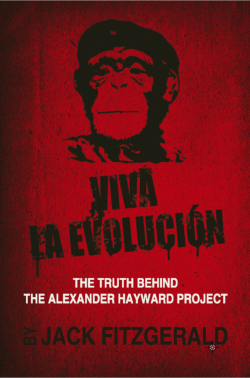 She gave him a lethal look. He got her message and quickly left to check out the more-friendly field of single women. She took a seat at the bar and played with her hair in a nervous tick sort of way. Suddenly she heard someone laughing. She turned around sharply. Looking at her straight in the eye was Marvin who was seated on the stool next to her. It was obvious he had had one martini too many. In a simple, over-alcoholic grin, he looked like a dead ringer for Alfred E. Newman of Mad Comics. She was definitely not impressed.
She gave him a lethal look. He got her message and quickly left to check out the more-friendly field of single women. She took a seat at the bar and played with her hair in a nervous tick sort of way. Suddenly she heard someone laughing. She turned around sharply. Looking at her straight in the eye was Marvin who was seated on the stool next to her. It was obvious he had had one martini too many. In a simple, over-alcoholic grin, he looked like a dead ringer for Alfred E. Newman of Mad Comics. She was definitely not impressed.
“What’s so funny?” she asked him.
“You. You’re one tough lady. Who are you?”
“You don’t recognize me? I’m Attila the Hun’s daughter.” He broke out in laughter. He then leaned over and took a good look at her.
“I know you. You’re that woman who hates Liberals and writes all those books about how terrible they are. You’re Anne Kool-aid, aren’t you?”
“Anne Coolidge, dip shit. Why don’t you have another martini and fall off your stool?”
“Ha, ha, very funny. I’ve got your number. You’re one of the Republican’s secret weapons, aren’t you?”
She bristled a bit. “How would you know, martini eyes?”“You’re really one plucky ducky, aren’t you?”
“Yeah, and who are you? A car salesman?”
“Nope. Just a teeny-weeny part of the bureaucratic machinery. Say, didn’t that guy say he drove you here in a Lamborghini?”
“Yeah, that’s right. Now, any other questions before I give you a license to get lost?”
Marvin laughed and said, “Hey, you’re pretty good with the one liners.”
“I’m glad you noticed. One thing about me, my friend, I always tell it like it is.”
“Meaning?”
“I find you dull, dull, dull. How’s that for a fit?”
He laughed uproariously. “Hey, you’re all right. For a minute there, I thought you didn’t like me. Allow me to buy you a drink and introduce myself.”
Before she could answer, he yelled to the bartender, “How about another martoonie for me and one of whatever this fantastic lady wants.”
The bartender came over, looked at her and said, “What’s your pleasure?”
As though she had nothing to fear from Marvin, she replied without looking at the bartender, “A Perrier without ice.”
She gave Marvin a slight smile and asserted, “I hope you don’t think this is your ticket to sweet talking me out of my panties.”
He squinted and tried to give her a decent smile. “You don’t think I’m that kind of guy, do you?”
“Please. Does Santa Claus have a beard? Is the pope Catholic?“
“A Perrier girl, huh? Now, what does that mean?”
“For you, it means, yes, I do but not with you.”
The bartender returned with their drinks. She took a look at her glass and it was filled with ice. She gave him one of her lethal glares. “I told you no ice!”
Marvin turned to the bartender and said, “I distinctly heard the lady say no ice. Now go throw it out and just bring her an empty glass.”
She gave Marvin a slight smile. He grinned back and said, “Does this mean you might have sex with me after all?”
“Are you kidding?” she replied. “No, today is not my day to be nice to village idiots.”
The bartender returned with a professional smile and an empty glass. He put it in front of her and walked away. “There you are—one Perrier and no ice,” Marvin said in almost baby talk. “All happy now?”
“Could be. What’s your name?”
He fumbled in his pocket and came up with a business card. He offered it to her with a flourish. She reluctantly took the card and read it out loud in a dull manner. “Dr. Marvin A. Pencock, Deputy Director, National Esoteric Analysis Foundation. Sounds almost important.”
“Not if the General Accounting Office has its way.”
“Why’s that?”
Marvin tittered and then gave her a goofy look, “It’s too ridiculous. You wouldn’t believe me if I told you.”
“Test me. I ‘m in the mood for some monkeyshines.”
Marvin broke out in a big laugh and slapped her on the back. “Lady, you must be psychic. Monkeyshines? You said it.”
“I’m afraid you’ve lost me, Bonzo.”
“The General Accounting Office today cut down the number of grants we hand out every year from 2,000 to just one.”
“Good for them but bad for you and your martini habit.”
“You telling me.”
“I don’t get what the connection is between the General Accounting Office and my using the word monkeyshines.”
“You’d laugh your head off if I told you,” he smirked.
“I wouldn’t be so sure about that. It takes a lot to make me laugh.”
He leaned in to her, almost spilling his martini on her, and said in a punch-line manner, “We’re giving our one grant this year to some boob out in California doing a study on something called Neotomy. It’s all tied into apes somehow. Monkeyshines? Get it?”
Anne’s face constricted tightly as though she had just been hit by a Mac truck. Marvin took a drink of his martini and continued. “And you know what? He doesn’t want any money – he only wants tap water from 7 of our major cities and here’s the kicker – he wants a gorilla. Have you ever heard of anything so crazy?”
He cracked up and spilled some of his Martini on himself and her. She cringed at him as she flicked some few drops of the liquid from her skirt. He noticed the unsmiling look on her face and said. “Frightening, isn’t it?”
She made herself smile a bit and then asked, “Do you come here often, Marvin?”
“It’s my second home. I have a continuous reservation for this bar stool. Why do you ask, love? Want to hang out and enter the Marvin zone with me?”
“You never know, Marvin. Now, if you’ll excuse me, I really must be going. You’re a rather interesting person it turns out. Maybe our paths will cross again one of these days.”
Without giving him a second look, she was up and on her way out of the club. Marvin watched her go with a big sigh. He then turned around to the hottie on his left and said, “How’d you like to jump aboard the Marvin Express?”
June 4, 2015
Self-Help Editing
“Trifles make perfection, and perfection is no trifle.” Michelangelo
Editing of your written work is necessary in everything from a screenplay, stage play or novel to an email message. It is well worth the effort. Editing comes in three areas: spelling, grammar & structure and punctuation. Carrying this job out is a slow process because accuracy is an absolute necessity. In this blog, however, we are not talking about re-writes because they are an entirely separate thing.
First of all, let’s take spelling. I know you say you have spell check. That does help a lot but it is far from perfect because this tool can’t tell an improperly used word from a correct word. Example: “Your late for work again.” That is a mistake which spell check will not catch. As long as the word is in the spell-check dictionary, it will not flag it as an error. (In this case you should have written “You’re late for work again.”) So, don’t get lulled into a false sense of security with your spell check.
Not everyone is well versed in basic grammar and structure—not even your grammar check on your computer. It will be of much help to you, but many times it does not catch things or will give you a false feedback. Be sure to use your grammar check but make sure you verify the flags it raises. Don’t blindly use it. Be judicious.
Punctuation is kind of out there on its own. Grammar check will not help you for the most as far as commas go. These little “gremlins” seem to be the big , bad trouble in editing. The old-time, basic rule for commas is if in doubt, leave it out. Over use of them is not good. A comma’s real reason in our writing is to tell the speaker or reader to pause for an instant. So, if they over-pause, it’s overkill.
If you’ve got the bucks, you can hire an editor to do all these things for you. However, if you’re not flush with money, you need to learn to depend on yourself. If you have a friend who will do it for you, that is a real gift. Even so, people who edit for a living charge by how much work is involved. So, if you do SELF-EDITING, you can bring that bill way down.
In an effort to help you in this task, today’s blog will present some of the most common errors you’re likely to find in your writing. Space, however, keeps this list to a short one. Remember, books have been written on this subject. I’m trying to cover the basics in something like two pages. Follow these tips and you’ll be ahead of the hounds in the editing department.
Spelling:
Your/You’re
your is possessive. Your book, your life, your uncle.
you’re is a contraction of you are. You’re doing very well.
Its/It’s
its is possessive. The house is just fine except its roof fell in today.
it’s is a contraction of it is. It’s a lovely day.
Their/There
their is possessive. Their car is beautiful.
there is location or pointing at something. There is where you must enter.
Principle/Principal
principle is a rule or law. Honesty is the principle we should live by. This country is based on the principle that all men are created equal.
principal is the primary or number one. Mr. Davis is the high school principal. The principal ingredient of a Coca Cola is sugar.
Punctuation:
If
If the sentence starts with if, you will have a comma after the if clause. If I were you, I’d leave.
You will have no comma if the word if is in the last half of the sentence. I’d leave if I were you.
Independent Clauses
An independent clause has a subject and a verb and makes very good sense by itself.
Two independent clauses are usually connected by a conjunction (and, but).
If the entire sentence has 16 or more words in it, you will put a comma before the and or but.
The two families ate alone but that did not bother them. (11 words and no comma.)
The two families from South Pasadena ate alone, but they were quite pleased to do so. (16 words and a comma.)
Dependent Clauses and Phrases
Dependent clauses and phrases are clauses (contain a subject and verb) or phrases (only a subject or verb but not both) and make no sense by themselves.
A dependent clause generally begins with a preposition (in, for, to, etc.) or the words before, after, during, when, or a word ending in ing.
To his credit, he left. (To his credit makes no sense by itself.)
Going in by himself, he was afraid. (Going in by himself makes no sense by itself.)
If I lived in Spain, I’d speak Spanish.
For John, the test was easy.
Upon leaving, he closed the door.
If the dependent clause begins the sentence, it will have a comma after it.
When he left, he shut the door.
Before he died, he made a will.
After he returned from his trip, he had to rest for a week.
During his time in office, he stole a lot of money.
If the dependent clause is in the last half of the sentence, it is not preceded by a comma.
When he left, he shut the door.
He shut the door when he left.
Punctuation goes inside quotes and parenthesis.
He said, “Let me go!”
Then I asked, “Why?”
“Because I’m afraid,” he said.
After writing “A Tale of Two Cities,” Dickens went on an American tour.
The man who bought my car got a first-class deal (or that’s what I let him think.)
Grammar and Structure
Overwriting
Limit the use of three or more syllable words and verbage (word garbage) in whatever you are writing. It causes poor readability. The reader’s brain gets tired processing all those extra syllables. For example, you can say “boss” instead of “manager” and you will have saved your reader two syllables of processing. Keep your reader alert by making what you’ve written easy to read. Your job is to express, not impress.
“Fire when ready.” (Admiral Dewey, Spanish-American War, 1898) instead of “After assuring yourself that all pertinent procedures and preparations have been accomplished, permission is granted to initiate the overall implementation of combat operations.“
Fewer vs. Less
Use “fewer” if the following word ends in an “s.”
Fewer students. Fewer calories—never less calories.
Use “less” if the word following contains no “s.”
Put less sugar in your coffee and you’ll lose weight.
I vs. Me
“I” comes before the verb and “me” comes after the verb.
This cake is for Phillip and me.
Never say: This cake is for Phillip and I. (You would never say: This cake is for I. So why would you want to say: This cake is for Phillip and I.?” The correct sentence is: This cake is for Phillip and me.
The Pronoun It
How many times can you use “it” in a sentence? Some people say three or maybe even four times. It was then that it got really scary because it’s not knowing if it would be safe to travel in it or not. What in the world does “it” stand for in this sentence? Better to put some nouns in there. Cut out the overuse of it and begin using nouns in their places. Your writing will be much clearer. Let’s clean up the example sentence above. The car backfired and I became scared. I had no way of knowing if the vehicle were safe to ride in or not.
Also watch that, those, this and these. Better to use a noun with them too for clarification’s sake.
That’s really not to my liking.
That kind of language is not to my liking.
Grammar Myths
You’ve been taught forever that it’s a sin to end a sentence with a preposition. Who is this burger for? At MacDonald’s, they simply do not have the time or the quality of employee to say, “For whom is this hamburger?” So forget this old chestnut and don’t let it terrorize you any longer.
The old boogeyman grammarians say, “Never split an infinitive.” Hogwash. Split them to your heart’s content. It’s the way people speak these days. You’re not the Queen of England, you know.
Further and Farther
Further is more and father is distance,
He spoke to me further on the subject after I got home.
The gas station is farther than I thought.
Be Specific—Not General
Being specific makes for great writing. Writing in generalities makes for “scratch the head” type writing.
I read three books last summer. (specific)
I read a lot last summer. (general)
Misuse of Reflexive Verbs
If the subject and the verb are the same person, place or thing, you will use a reflexive verb, myself, yourself, himself, itself, ourselves, yourselves, and themselves.
I shave myself.
He cut himself.
Many people are confused and think they’re hobnobbing with the Queen by saying, “The teacher gave an A plus to David and myself.” And it certainly isn’t “The Teacher gave an A plus to David and I.” Being that the subject and the object are not the same person, then it has to be ”me.”
“The teacher gave an A plus to David and me.”
Over-Loaded Sentences.
For ease of reading, try not to have over two thoughts in a sentence. Just as sure as you use three or more, your reader will become confused and have to re-read. Make it simple and no head-scratching will occur.
My favorite flavor ice cream is chocolate and my second is peach but I can’t stand exotic flavors like pumpkin. (over-loaded)
My favorite flavor ice cream is chocolate and my second is peach. I can’t stand exotic flavors like pumpkin. (just right)
I hope these tips prove helpful to you. So, get busy editing the last thing you have written–be it an email or the great American novel, stage play or screenplay.
May 28, 2015
Ersatz Marketing
A couple of weeks back I wrote a blog about Marketing. In it, I gave out some pretty stringent Dutch Uncle advice as to why you must pay most particular care to this part of your writing career. If you have tons of money to promote your writing project, and I’m talking about tons, then you can skip this week’s blog and just simply buy your way into success—much the same as many politicians are doing these days.
However, if you are not one of those blessed with an aristocratic family fortune, then perhaps you should stick it out with the peons and work your way though this blog.
In the 1950s most people in the United States could keep their front doors unlocked when they were home. They could write a letter to just about anyone and the chances of it getting read or acted upon was at least within the realm of achievable. I can remember my Aunt Nanny Lou writing a fan letter to a very popular film star of her day named Barbara Stanwyck. My aunt was very pleased to receive not only a short answer but a nice handkerchief. Then there is the story I heard about the popular film star Gloria Swanson who upon receiving a letter from an unhappy child ended up adopting her. This story I heard first hand from the young lady she adopted. Then Vicki Lawrence who was so popular on the Carol Burnett show had simply written a letter to CBS stating that she would make the perfect kid sister for Carol on her show. The rest is history.
Then we come to how all of the above anecdotal information pertains to would-be writers. In the past, only a few dedicated people with almost a calling turned to writing. It was not an easy profession. In the time of Dickens everything had to be written by hand and submitted that way. Then even with the advent of the typewriter, people had to make carbon copies, erase errors and re-type ad-infinitum.
In the 1950s, 60s and 70s, writing still was a tough row to hoe and your only helpers were white out and an eraser. Many times writers had to pay professional typists to get their manuscripts in proper order for submission. Then you contacted an agent or a publisher via a self-addressed, stamped envelope. At least out of ten such mailings, someone would read your letter and invite you to submit your manuscript. Then if your work were good enough, an agent would offer to represent you or a publisher would buy your work. While this process was all happening, you had to have some way to eat and a place to sleep. Not to worry. There were tons of jobs for people like you—part-time and full-time. In other words, you had a fighting chance of getting your toe in the door of the writing world without humongous stress.
Ah, those were the idyllic days. Now, let’s fast forward to nowadays. Well, things have changed. Instead of just you and a few others dreaming of becoming authors, an explosion has hit the writing scene. Due to the fact that Microsoft Word is now practically the only way people write, you have millions entering the writing game seeking fame and fortune.
Computers are so highly developed these days, they can be used as an invaluable partner in your writing career. In the stone age when I used a typewriter, I had to re-type pages and pages if I changed a name or did any rewriting. Now with a computer, it’s just a couple of clicks and the job is done. You have spell check, grammar check and it doesn’t stop there. A friend of mine alerted me the other day to an Internet course selling for only $49 that will guide you through every step of writing your novel. In fact, this program is as close to being “write by numbers” as “paint by numbers” was some years back. At that time you could become Rembrandt for just a few dollars. Apparently the same thing has happened these days with the writing game. For only $49 you can become a Hemmingway.
After you’ve written your novel these days, no matter if it is good, bad or indifferent, you don’t need to worry about a publisher. There are tons of them out there who will publish your book for a fee. The catch is they will do no marketing for you. That’s up to you. Suddenly you panic because you have no idea what marketing is or how to apply it.
Boy, have things changed n the last 50 plus years. The simplicity of life no longer exists. Trust is a factor that has flown out the window. Being nice no longer exists for you when you’re on the outside looking in – unless you pay for “nice.” Receiving anybody’s attention has become a quality that comes with a price tag these days.
All I have written so far here is to prime you up to the fact that “access” to other people these days has turned commercial. No longer can you hope in an “over the transom” manner to connect with people in the entertainment business. A week doesn’t go by that someone, thinking they are being helpful, will tell me how I might become rich and famous overnight. “It’s simple,” they will say. “Get your work to Oprah .” Yeah, can’t you just see how easy access would be to Oprah? Like ring her doorbell? Ridiculous.
 It’s a total waste of time to send letters to producers, editors, and publishers. As far as agents go, you can send them emails but due to the fact that everyone and his dog are writers these days, you are in a slush pile of many hundreds of emails. They even tell you that it will take around two to three months to hear back—and that is only if they are interested in you. Most agents let you know right up front that they are not interested in you unless you come recommended by someone.
It’s a total waste of time to send letters to producers, editors, and publishers. As far as agents go, you can send them emails but due to the fact that everyone and his dog are writers these days, you are in a slush pile of many hundreds of emails. They even tell you that it will take around two to three months to hear back—and that is only if they are interested in you. Most agents let you know right up front that they are not interested in you unless you come recommended by someone.
Submitting cold emails (cold meaning without a recommendation) to an agent is called LOTTERY MARKETING. Just as with the lottery, millions lose but one person wins. That’s about your odds when you write to an agent these days. Even so, this form of marketing gives you a remote chance of getting a favorable reply—so in a curious way, it slips under the acceptable form of marketing—but barely.
So what is ERSATZ MARKETING? This is what I call the “fool’s gold” of marketing practices. You PAY MONEY for everything connected with ACCESS. In my recent blog about MARKETING, I recommended a book by Writers Digest called “Guide To Literary Agents.” It lists all the agents and that is where you will play your game of LOTTERY marketing— if you so desire. However, notice. Under each agent’s listing are the names of the workshops they will be attending or hosting—or hustling. That means, gentle readers, that they are hawking for you to pay to come and meet them for a price. You might get ten minutes of their time for your hundred or two-hundred bucks. The prevalent idea today is that workshops are the most wonderful way ever to gain access to an agent. You pay them and access is yours, the deluded say with a chipper grin. The real problem here is that thousands of people attend these writer workshops. They’re held at grand resorts, on cruise ships and you name it. The name of the game is we get your money and you get nothing but a handshake and a smile. Perhaps you could call this the GOLDEN HANDSHAKE LOTTERY method of marketing. It’s fool’s gold as far as I’m concerned.
Then you have contests and the registration Internet sites. These guys are making a ton of money these days off of your desire for some sort of access and recognition. It’s essentially another form of LOTTERY MARKETING. These guys are selling supposed access to the industry powerful—and they’re getting rich off of your dreams. And you? Well, 99 and 44/100 of you get absolutely nothing but maybe a boilerplate critique of your work.
Also there’s POD LOTTERY. Pod cast people are even into the game these days. For a measly two-hundred or so bucks of your money, they’ll interview you for ten or fifteen minutes. Look at the money they are raking in. Bottom line—who’s listening to these phony pods? You, your relatives and your friends but certainly not Mr. DeThrill of Colossal Studios.
I could go on and on but I don’t have to. I think you see the picture I’m trying to paint of ERSATZ MARKETING. My best advice is to go back and re-read my blog of two weeks ago about MARKETING and see what you should do to overcome this rash of national greed. At least my blog doesn’t cost you anything.
If you pay over five to ten dollars for any service connected with the writing profession, the chances are you’re getting played for a sucker. So you won’t think I’m a complete curmudgeon, you can find good writing workshops for free or at a very low fee if you will just look for them. I noticed this week The New School, a university in New York City, was having a great workshop and it was only $5 to attend. So, look for these types of places and give those other bums a kick in the pants. My very best to you in your writing adventures.

